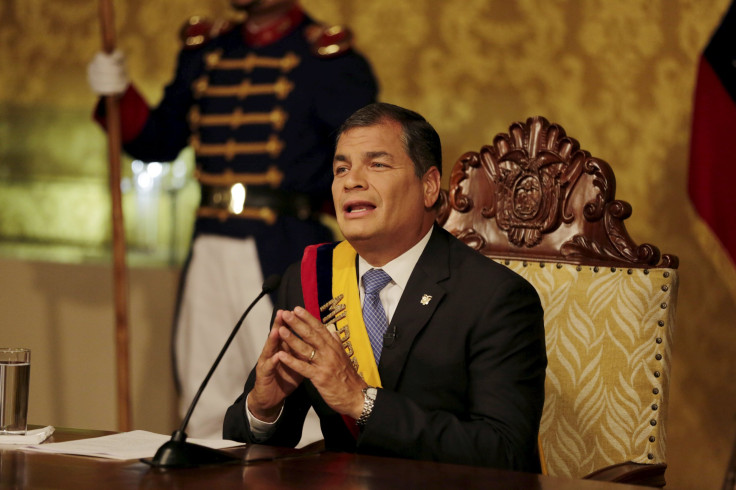Ecuador Fundamedios Media Watchdog's Impending Closure Creates International Backlash Over Free Speech

Ecuador is drawing condemnation from human rights and free-speech advocacy groups around the world for its decision this month to initiate the closure of Fundamedios, the South American country’s last remaining independent media watchdog. But so far, the government of President Rafael Correa is not backing down. While its latest move against Fundamedios marks a harsh blow to Ecuador’s media landscape, it also caps off a larger crackdown on hundreds of news outlets that has continued since Correa took office in 2007.
Fundamedios was founded that year to help keep tabs on the state of free press in Ecuador. It regularly issues reports on threats or attacks against journalists and government efforts to censor publications. Ecuador’s secretary of communications issued a letter to the organization Sept. 8 saying it would be dissolved for violating a statute barring social organizations from getting involved in “politically partisan activities.” The missive pointed to several posts on Fundamedios’ Twitter account that linked to articles critical of the Correa administration as evidence of the violation.
The group has until Thursday to appeal the decision, but there are no expectations that such a move would be successful. The notification was meant to "put our head on a silver platter into the hands of our main aggressors," César Ricaurte, Fundamedios' executive director, told Ecuador’s El Comercio newspaper last week. “It’s evident that [the secretary of communications] is the operator and executor of a curtain of constant harassment against independent journalism.” It is unclear if there have ever been any successful comparable appeals.
International rights groups including Human Rights Watch, Freedom House and the New York-based Committee to Protect Journalists have criticized the decision in recent days. “The Correa administration wants to punish an organization for tweeting articles with news and opinions it doesn’t like,” Daniel Wilkinson, Human Rights Watch’s managing director for the Americas, said in a statement. “This is an egregious abuse of power and a clear example of this government’s authoritarian practices.”
Press freedom has been one of Ecuador’s thorniest issues under Correa’s presidency. The president won his first major lawsuit against a news outlet in 2012 when the four owners of El Universal newspaper were convicted of libel, sentenced to three years in prison and ordered to pay fines totaling $80 million for publishing an opinion piece critical of the administration. Correa eventually pardoned them, but the government continued to fine or shutter news outlets over violating various government regulations -- measures that free-speech watchdogs, including Fundamedios, deemed retaliation against outlets airing criticism of government.
The Correa Admin. made the politically motivated decision to close Fundamedios. We strongly condemn this action -@RepEdRoyce @RepEliotEngel
— Foreign Affairs Cmte (@HFACDemocrats) September 10, 2015
Correa has also frequently taken to his weekly television broadcast to denounce news publications, at times physically tearing up broadsheets on camera and accusing outlets of defamation.
The administration gained sweeping authority to assert new regulations on Ecuadorian media with a new communications law in 2013, passed by lawmakers from Correa’s ruling Alianza Pais party. Labeled by opponents as a “gag law,” it created an official agency for issuing sanctions against publications that violate government statutes. That agency has issued a total of 313 penalties against 198 media organizations since the law came into effect in 2013. The law has contributed to a severe squeeze on democracy in Ecuador, according to rights group Freedom House, which downgraded the country’s free press grade by 12 points on a 100-point scale from 2009 to 2014.
In recent years, the administration has taken aim at Ecuador’s political cartoonists. Correa sued well-known cartoonist Xavier Bonilla, known as Bonil, in 2014 over an illustration blasting the police raid of a journalist a year earlier. The government’s media monitoring agency, known as Supecom, ordered Bonilla to “correct” the cartoon. It also ruled that another Bonil cartoon that ran late last year mocking Congressman Agustin Delgado exhibited “socioeconomic discrimination,” and ordered his newspaper, El Universo, to run an apology for the cartoon over the course of seven days.
Two days after the Correa administration announced the impending closure of Fundamedios, it issued sanctions on two newspapers, La Hora and Expreso, both of which have come under heavy government criticism. Both newspapers were ordered to run public apologies for running an advertisement from the Ecuadorian Association of Editors and Newspapers questioning the 2013 communications law.
Fundamedios is continuing to hit back against the impending closure with a petition to protest the move. But Ecuadorian government officials said they will move forward with the process to dissolve the group.
“This is an administrative process that is ongoing,” Ecuador’s vice chancellor, Leonardo Arizaga, said Friday during a visit to Washington. “I can say that every foundation, every NGO, has to respect the law and comply with statutes.”
© Copyright IBTimes 2025. All rights reserved.






















